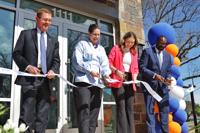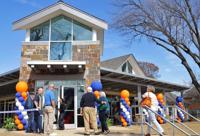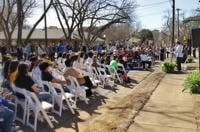
Every house on Greek Row tells its own story, with community etched into the Greek letters engraved alongside each building. Since the Fraternity and Sorority Life was established on campus in the ’60s, there’s never been a place for each community to come together.
The new Greek Life Community Center fulfills just that.
The $5.1 million facility stands at the edge of Greek Row Drive, centered proudly across from several fraternity and sorority houses. Its 8,900 square feet provides space for gatherings, trainings and events, complex meeting rooms, a banquet space, a library, ritual rooms and a versatile outdoor area.
Andrew Miller, Student Affairs senior associate vice president and dean of students, said the center was built on the site of a former Greek organization’s house. The site contained a fairly large piece of land, and its proximity to other Greek houses made it appealing.
The facility held its official ribbon cutting Feb. 27 where the FSL community celebrated its new space. A preceding, exclusive soft opening for Greek life members took place Feb. 2.
FSL Director Amanda Perez said UTA has a vast campus that is easy for students to get lost in. If students recognize the new building as their home, it can help them stay grounded and build community with each other.
“It’s been a great time to actually witness and see them come together and get to know each other outside of their chapters,” Perez said.
The community center puts a new staple atop decades of the university’s Greek life history.

Before 1967, UTA was Arlington State College and part of the Texas A&M University System, according to previous Shorthorn reporting. Under that system, nationally-affiliated Greek organizations were allowed on campus under the label of social clubs but weren’t considered members of national organizations.
Those groups would become some of the fraternities and sororities on campus today, where students now continue to drive their legacy forward and find a place of belonging.
Nick Utsey, National Pan-Hellenic Council president, is one of the many students who found a home in FSL. He said the community center will help unify Greek life further.
“I’ve definitely been able to create a bond with people outside of my organization,” Utsey said. “The brothers and sisters that I’ve gained through being a part of fraternity and sorority life are quite literally like the family that I never had growing up.”
Building community beyond the constraints of individual chapters is important, he said.
“While we all are different organizations, we all hold the same bearing, which is to provide service to our community, provide service to UTA in whatever capacity that looks like,” Utsey said.

The center’s community outreach does not stop at students. Alumni and even soon-to-be Mavericks are welcome to become a part of the space.
“We do a lot of work with the community,” Perez said. “This past weekend, our Pan-Hellenic Council hosted a brunch for high school seniors who have already been admitted to the university.”
While UTA’s FSL program is growing with a 30% uplift from last year, it’s still on the smaller side, totaling a little under 700 students, she said. Having the community center should improve FSL’s campus visibility and attract more students into the program.
“UTA isn’t the stereotypical commuter school,” she said. “There are organizations here, there’s fraternities, there’s sororities, and I think sometimes you have to see it to believe it, so this is a great way for them to see it.”
Perez said one thing she took note of from the University Center’s design is the lack of windows and its private nature. Even if events are public, she said it’s often impossible to know what is happening in the building.
Unlike the UC, the community center’s open design will allow those passing by to see what the groups are doing and give them a better idea of what FSL is all about.
The new center will also provide a space for the chapters that don’t have a house to call their own. Many of the houses on Greek Row are privately funded by different organizations, Utsey said.
“The community center is essentially to bridge that gap of not having a centralized place for a lot of students to be in and conduct chapter business,” he said.
Damien Gamez, president of the Multicultural Greek Council and vice president of Delta Alpha Omega, followed the community center through its entire construction process and became a part of its staff. Gamez would go check on the building’s progress almost every other day.

“It’s been amazing to see it all come together. It’s been unreal because now it’s open,” he said. “The amount of people I see coming here and just to be able to study or hang out or make coffee, it’s really fun.”
For Gamez, having UTA recognize FSL and invest its resources into the center is meaningful. Between community outreach, community service and campus events, he said Greek life does a lot for the university.
Faculty and staff also share that sentiment. Miller said as the university continues to push student life forward, Greek life is a crucial part of the process.
“A really healthy Greek life, fraternity, sorority life program is often one of the centerpieces to a more vibrant campus culture,” he said.
Sigma Chi president Alec Boyle said that from his experience working at the center, the space is one of a kind, and it’s the first time he’s ever seen everyone come together — chapters aside.
“It’s like the staple of Greek Row now,” Boyle said. “Once you drive by, this is the building you’re looking at. You’re obviously seeing all the houses, but this is the Greek center everyone comes together in.
@PMalkomes
















